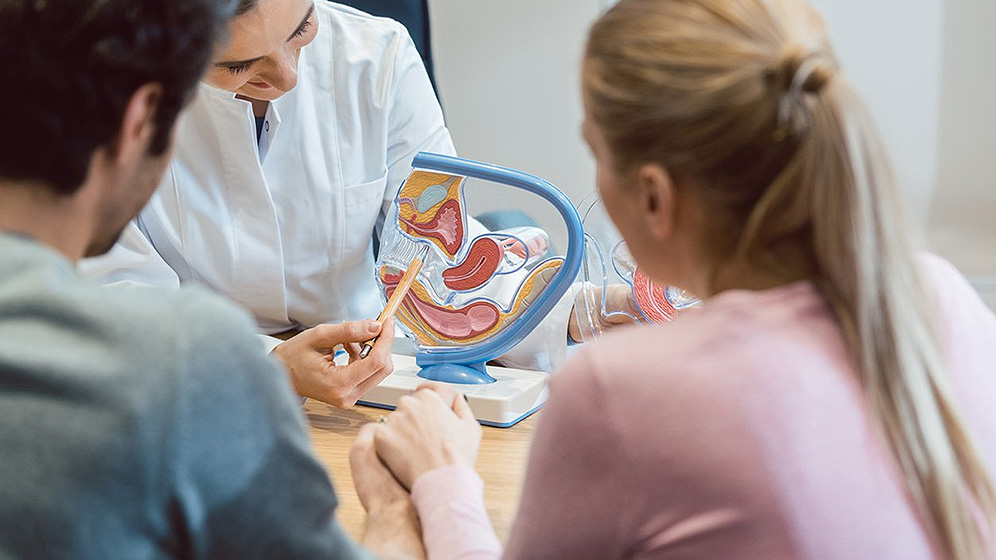Dealing with Infertility – Diagnosis & Support

Guidelines from fertility specialists and doctors state that you should seek the advice of a reproductive endocrinologist if you are under 35 and have had unprotected intercourse for 12 months without a pregnancy. However, if you are over age 35, you should only wait 6 months to seek the advice of a fertility specialist. Your physician can refer you to a fertility doctor, or you can find one in your area on www.resolve.org.
Fertility Counseling to Identify Causes & Signs of Infertility
There can be many causes of infertility, some of which are within your (or your partner’s) control, and some that are not. If you are experiencing fertility problems, a reproductive endocrinologist can perform basic tests on both the woman and man to reach a diagnosis and suggest a course of treatment. When you go in for fertility counseling, be sure to ask questions, research your options, and get a second opinion if you are not comfortable with the information your medical team is providing.
When the Diagnosis is Infertility
If you’ve been hoping and planning for a baby and learn that you have fertility problems that make your desires difficult or unlikely, you can feel disappointed and even devastated. Rest assured that your feelings of loss and frustration are completely normal. Protecting yourself is a basic human response, and it can be painful to see pregnant friends and children when you are experiencing fertility problems.
It is important to learn how to take care of yourself, make sure you get the support you need, and manage your emotions so that your self-esteem and outlook on life remain as positive as possible. A fertility support group can help you learn to cope with infertility and manage your feelings around it in a caring environment.
To avoid feelings of isolation, doctors recommend that you talk to others experiencing infertility by joining a support group, or online discussion board. This connection to others will give you a community that cares and help you cope with the emotions that accompany an infertility diagnosis. If you are depressed or have an overwhelming feeling of loss or sadness, you may want to seek the help of a trained, mental health professional. Organizations like RESOLVE can help you find one close to you.
Health Care Options for Fertility Problems
Although health insurance guarantees that a covered individual will not bear the entire burden of their healthcare expenses, in the case of infertility, many patients must cover the costs of treatment themselves due to lack of insurance coverage for fertility problems. Insurance policies vary widely in terms of what procedures they will cover and at what cost to you.
If you are seeking testing to discover the causes of infertility or treatment from a reproductive endocrinologist after experiencing fertility problems, it is important to thoroughly review and seek clarification about the provisions of your particular health care plan options. Pay specific attention to covered benefits, exclusions, and restrictions as they relate to reproductive health services and infertility diagnosis and treatment. You’ll also want to review your out-of-pocket expenses, deductible, and co-insurance responsibilities to determine how much your insurance may pay toward fertility counseling and procedures.
In order to get accurate information, your health plan administrator should provide you with a copy of your plan's Summary Plan Description (SPD). It outlines your benefits, covered services and your legal rights under the Employee Retirement Income Security Act (ERISA), the federal law that protects your health benefits. A few states have insurance mandates for the diagnosis and treatment of infertility. Visit www.resolve.org to find out if your state has mandated coverage and if you qualify for this coverage.
The Benefits of Belonging to an Infertility Support Group
Perhaps one of the most important benefits of participating in an infertility support group is a decreased sense of the isolation many people feel when they are experiencing infertility. In a support group environment, feelings of anger, depression, guilt and anxiety can be expressed, validated by others, and accepted as a normal response to the infertility crisis. Support group members often realize how their experiences in the group create a special bond and identity among group members. By sharing feelings, accomplishments, losses, and humor known only to those who experience infertility, members can develop strong emotional ties to one another.
By offering a safe place to express and explore the feelings generated by the infertility experience, support groups help participants move toward a positive resolution of this difficult life crisis.



